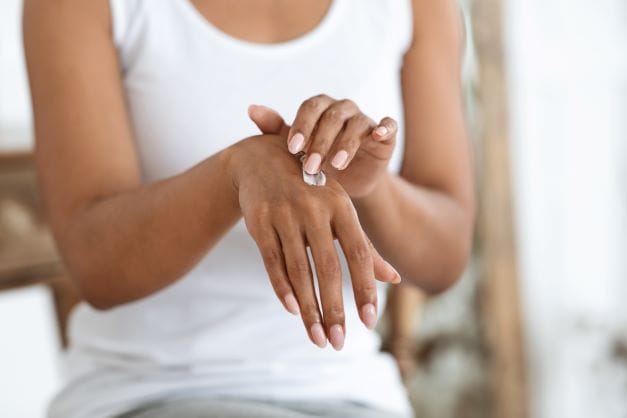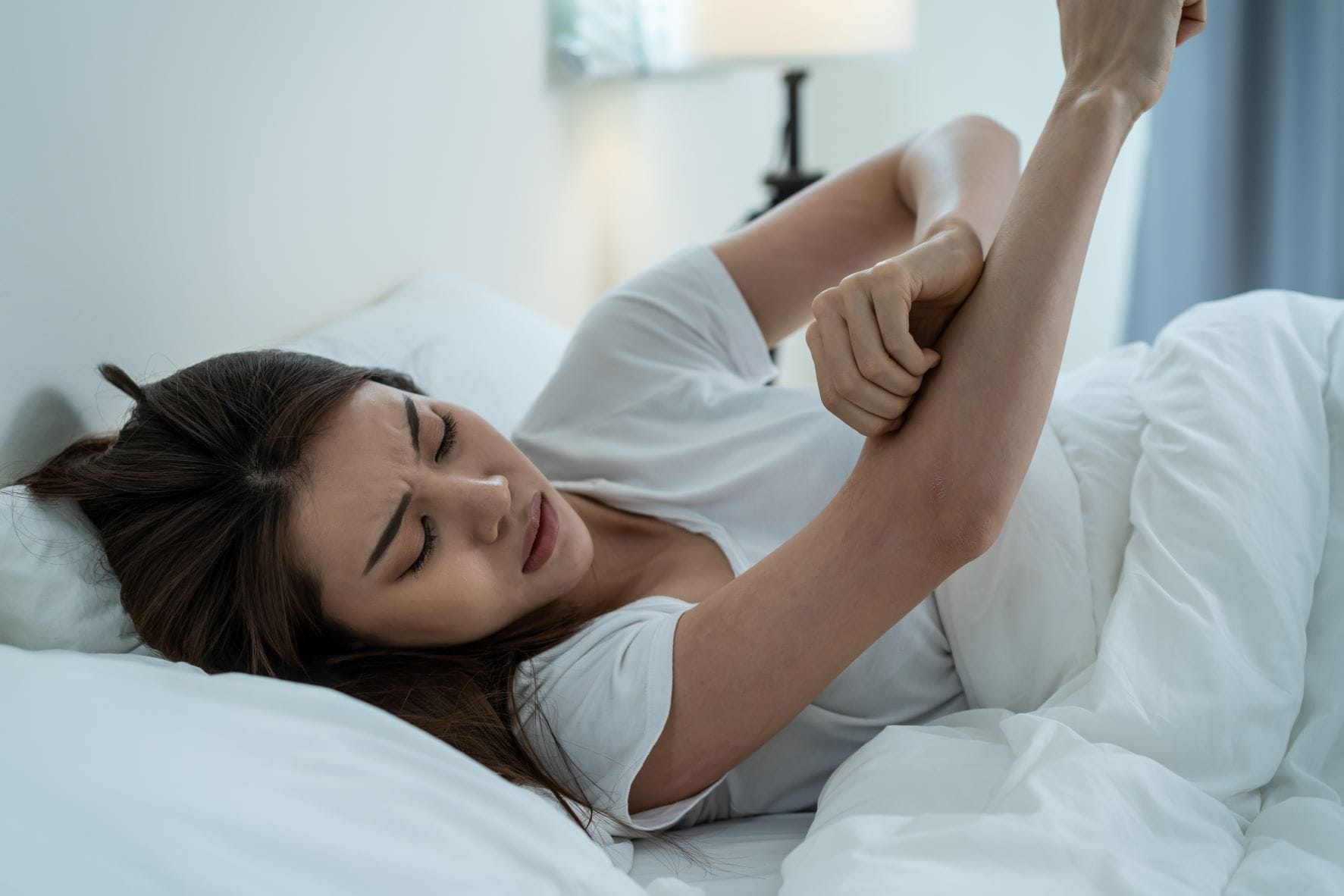Individuals with eczema or atopic dermatitis typically develop itchy, dry, reddish, or purplish swollen skin patches. If you have had the condition for some time, you know the discomfort it can cause at night. Depending on the severity, it can prevent you from sleeping straight due to the uncomfortable itchiness. (1)
The triggers for eczema flare-ups can vary for each individual. Generally, there may be a lag between the trigger and the symptoms. Common triggers include fabrics, harsh soaps, sweat, animal dander, hot or cold weather, stress, dry skin, and irritants. (2)
Why do eczema flare-ups occur at night?
Most people with eczema tend to experience sleep disruption. The main reason why eczema is likely to flare up at night remains vague, but possible environmental and genetic factors can play a role. (3)
Some of the reasons the symptoms of eczema get worse at night may be the sleep and wake cycle in which the body temperature drops at night, making the skin feel itchy. (4)
Other possible causes include the tendency for some people to scratch while sleeping, which can aggravate the itchiness, the moisturizer you used having worn out, and the sheets or clothing irritating the skin.
Ways to minimize itchiness from eczema flare-ups
If you want to enjoy uninterrupted sleep, make it a priority to avoid potential triggers before going to bed to help lessen the severity of the eczema flare-ups.
- Bathing and moisturizing the skin
Taking a bath in the evening and moisturizing your skin with a moisturizer or emollient may help reduce nighttime itchiness.
Ideally, you need to apply moisturizer within three minutes after a bath or shower while the skin is still damp to seal in the moisture or 20 to 30 minutes before bed. (5)

It may be best to apply oil-based moisturizers or medicated creams containing steroids. If in doubt, consider consulting a doctor for a more potent version. Among the various skin care products to minimize the itchiness due to eczema flare-ups at night, you might want to try out reliable choices, including Dermeleve.
- Keep your bedroom at a comfortable temperature
A warm environment is likely to trigger an eczema flare-up at night. Some people wake up at night because they are overheated, aggravating the itching.
Make sure to adjust the thermostat before going to bed. In most cases, you might need to lower the temperature. (6)
If you have the funds, it may be time to upgrade to an automated temperature system that you can program to lower the temperature at night.
Regulating the temperature in your room may help lessen the severity of the eczema flare-ups. Finding the most comfortable one at night will take some trial and error.
- Wear appropriate sleepwear
The clothing you wear at night can impact your overall comfort. Proper clothing is essential because certain fabrics can cause an eczema flare-up. (7)
Avoid wearing sleepwear made of tight, scratchy, or rough fabrics. Wear appropriate clothing to avoid sweating throughout the night, depending on how cold or warm it is.
If you enjoy wearing pajamas, consider switching to slack, airy, breathable fabrics that absorb moisture. Generally, pajamas made of pure cotton are the best options. Avoid fabrics such as polyester or wool that can irritate the skin.
- Use bed linens that are soothing or non-irritating
The beddings you use can trigger eczema flare-ups in the same way as your sleeping wear. In the same way, the linens you use can also affect your body temperature while sleeping. Thus, it’s best to use pure cotton or bamboo linens that can be washed and dried.
Dust mites can trigger eczema. Hence, you should invest in dust mite covers for the mattress and pillows. Covering your mattress and pillows with these covers may help minimize itchiness at night. (8)
If you want to sleep comfortably at night, make sure you have clean, soft linens made of breathable fabrics, such as linen bed sheets. Linen bed sheets are not only incredibly comfortable, but their natural fibers also promote better airflow, helping you stay cool and relaxed during warm nights.
- Observe proper sleeping hygiene
The same sleeping habits that help people without eczema sleep better may work for those with eczema. Some examples of good sleep hygiene habits to consider are the following:
- Maintain a consistent sleep and wake schedule daily to train your body to sleep and stay asleep.
- Try to engage in relaxation techniques, ideally an hour before going to sleep, such as taking a bath, reading a book, meditation, and listening to soothing music.
- Avoid smoking, eating heavy meals, and drinking caffeine-containing beverages before bed.
- Avoid using your phone or computer before bed because the light emitted by electronics can trick the brain into thinking it’s not yet time to sleep.
Taking these measures into consideration, they aim to minimize feelings of anxiety and stress that can disrupt your sleep. When you lower your stress levels, it can help reduce the itchiness of your eczema flare-ups.
Final thoughts
Many people experience eczema flare-ups that trigger skin irritation at night. Unfortunately, it can disrupt your sleep. If you’ve been having trouble sleeping due to eczema flare-ups, these useful itch relief options may help reduce the irritation and allow you to sleep comfortably.
References:
1. “Eczema”, Source: https://onlinelibrary.wiley.com/doi/abs/10.1002/msj.20289
2. “Triggers in atopic dermatitis/eczema : separating fact from fiction : review article”, Source: https://journals.co.za/doi/abs/10.10520/EJC154969
3. “Incidence of hand eczema in a population-based twin cohort: genetic and environmental risk factors”, Source: https://onlinelibrary.wiley.com/doi/abs/10.1111/j.1365-2133.2007.08088.x
4. “Nocturnal eczema: Review of sleep and circadian rhythms in children with atopic dermatitis and future research directions”, Source: https://www.sciencedirect.com/science/article/abs/pii/S009167491501252X
5. “Emollients and moisturisers for eczema”, Source: https://www.cochranelibrary.com/cdsr/doi/10.1002/14651858.CD012119.pub2/full
6. “Climatic Factors Are Associated with Childhood Eczema Prevalence in the United States”, Source: https://www.sciencedirect.com/science/article/pii/S0022202X1536320X
7. “Fabrics for atopic dermatitis: Dr Rupert Mason discusses the pros and cons of different fabrics for use in atopic dermatitis”, Source: https://go.gale.com/ps/i.do?id=GALE%7CA178451998&sid=googleScholar&v=2.1&it=r&linkaccess=abs&issn=14749114&p=AONE&sw=w&userGroupName=anon%7E480a33c1
8. “The Link Between Dust Mites and Eczema”, Source: https://www.healthline.com/health/eczema/dust-mite-eczema







